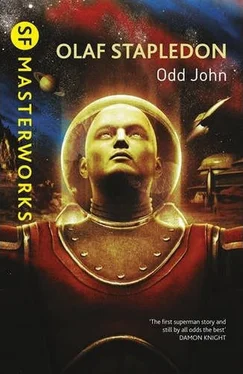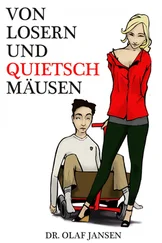Olaf Stapledon - Odd John
Здесь есть возможность читать онлайн «Olaf Stapledon - Odd John» весь текст электронной книги совершенно бесплатно (целиком полную версию без сокращений). В некоторых случаях можно слушать аудио, скачать через торрент в формате fb2 и присутствует краткое содержание. Город: London, Год выпуска: 2012, ISBN: 2012, Издательство: Hachette UK, Жанр: Фантастика и фэнтези, на английском языке. Описание произведения, (предисловие) а так же отзывы посетителей доступны на портале библиотеки ЛибКат.
- Название:Odd John
- Автор:
- Издательство:Hachette UK
- Жанр:
- Год:2012
- Город:London
- ISBN:9780450038570
- Рейтинг книги:5 / 5. Голосов: 1
-
Избранное:Добавить в избранное
- Отзывы:
-
Ваша оценка:
- 100
- 1
- 2
- 3
- 4
- 5
Odd John: краткое содержание, описание и аннотация
Предлагаем к чтению аннотацию, описание, краткое содержание или предисловие (зависит от того, что написал сам автор книги «Odd John»). Если вы не нашли необходимую информацию о книге — напишите в комментариях, мы постараемся отыскать её.
Odd John — читать онлайн бесплатно полную книгу (весь текст) целиком
Ниже представлен текст книги, разбитый по страницам. Система сохранения места последней прочитанной страницы, позволяет с удобством читать онлайн бесплатно книгу «Odd John», без необходимости каждый раз заново искать на чём Вы остановились. Поставьте закладку, и сможете в любой момент перейти на страницу, на которой закончили чтение.
Интервал:
Закладка:
During the few weeks which passed before the sailing of the yacht, Lo occupied the room which had once belonged to Anne, John’s sister. Relations between her and Pax were never easy, yet always amicable. Lo was exceptionally silent. This, I am sure, would not trouble Pax, for she was generally drawn to silent persons. Yet with Lo she seemed to feel constantly an obligation to talk, and an inability to talk naturally. To all her remarks Lo would reply appropriately, even amiably, yet whatever she said seemed to make matters worse. Whenever Lo was present, Pax would seem ill at ease. She would make silly little mistakes in her work, putting things into wrong drawers, sewing buttons on in the wrong place, breaking her needle, and so on. And everything took longer than it should.
I never discovered why Pax was so uncomfortable with Lo. The girl was, indeed, a disconcerting person, but I should have expected Pax to be more, not less, able to cope with her than others were. It was not only Lo’s silence that was so disturbing, but also her almost complete lack of facial expression, or rather of changes of expression for her very absence of expression was itself expressive of a profound detachment from the world around her. In all ordinary social situations, when others would show amusement or pleasure or exasperation, and Ng-Gunko would register intense emotion, Lo’s features remained unmoved.
At first I imagined that she was simply insensitive, perhaps dull-witted; but one curious fact about her soon proved that I was wrong. She discovered a passion for the novel, and most of all for Jane Austen. She read all the works of that incomparable authoress over and over again, indeed so often that John, whose interest ran in very different channels, began to chaff her. This roused her to deliver her one long speech. “Where I come from,” she said, “there is nothing like Jane Austen. But in me there is something like that, and these old hooks are helping me to know myself. Of course, they are only ‘sapient,’ I know; but that is half the fun. It’s so interesting to transpose it all to suit us . For instance, if Jane could understand me, which she couldn’t, what, I ask myself, would she say about me? I find the answer extraordinarily enlightening. Of course, our minds are quite outside her range, but her attitude can be applied to us. Her attitude to her little world is so intelligent and sprightly that it gives it a significance that it could never have discovered in itself. Well, I want to regard even us, even our virtuous Colony, in a Jane-like manner. I want to give it a kind of significance that would have remained hidden even from its earnest and noble leader. You know, John, I fancy Homo sapiens has still quite a lot to teach you about personality. Or if you are too busy to learn, then I must, or the colony will be intolerable.”
To my surprise John replied by giving her a hearty kiss, and she remarked, demurely, “ Odd John, you have indeed a lot to learn.”
This incident may suggest to the reader that Lo was lacking in humour. She was not. Indeed she had a gift of not unkindly wit. Though she seemed incapable of smiling, she often roused others to laughter. And yet, as I say, she was mysteriously disconcerting to most of us. Even John was sometimes uncomfortable in her presence. Once when he was giving me some instructions about finance he broke off to say, “That girl’s laughing at me, in spite of her solemn face. She never laughs at all, and yet she’s always laughing. Now tell me, Lo, what’s amusing you.” Lo replied, “Dear and important John, it is you who are laughing, at your own reflection in me.”
Lo’s chief occupation during her few weeks in England was to master the science and art of medicine, and to make herself acquainted with all the most advanced work on the subject of embryology. The reason for this I did not learn till much later. Her vocational training she pursued partly by means of an intensive study under an embryologist of some distinction at the local university, partly by prolonged discussion with John.
As the time approached when the yacht was to be ready and the adventure to begin, Lo’s studies became more and more exacting. She began to show signs of strain. We urged her to take a holiday for a few days. “No,” she said, “I must get to the end of this business before we sail. Then I will rest.” We asked if she was sleeping all right. She was evasive. John became suspicious. “ Do you sleep, ever?” he asked. She hesitated, then replied, “Not ever , if I can help it. In fact it is some years since I last slept. And then I slept for ages. But I will never sleep again if I can help it.” Her first answer to John’s incredulous “Why?” was a shudder; then she added as an afterthought, “It is a waste of time. I do go to bed, but I read all night; or just think.”
I forget whether I mentioned that all the other supernormals were brief sleepers. John, for instance, was satisfied with four hours a night, and could comfortably do entirely without sleep for three nights at a stretch.
A few days after this incident I learned that Lo had not come down to breakfast, and that Pax had found her still in bed, and asleep. “But it’s all wrong,” said Pax, “It’s more like a fit. She’s lying there with her eyes tight shut and awful expressions of horror and rage passing over her face; and she keeps muttering Russian or something, and her hands keep clawing at her chest.”
We tried to wake her, but could not. We sat her upright. We put cold water on her. We shouted at her. We shook her and pricked her, but it was no good. That evening she began to scream. She kept it up, off and on, all that night. I stayed with the Wainwrights, though I could do nothing. But somehow I couldn’t go. The whole street was kept awake. It was sometimes just an inarticulate screech like an animal beside itself with pain and fury, sometimes a torrent of Russian, shouted at the top of her voice, but so blurred that John could make nothing of it.
Next morning she quictened down, and for more than a week she slept without stirring. One morning she came down to breakfast as though nothing had happened, but looking, so John said, “like a corpse animated by a soul out of Hell.” As she sat down she said to John, “ Now do you understand why I like Jane Austen, better for instance than Dostoievski?”
It took her some time to regain her strength and her normal equanimity. One day, when she had settled down to work again, she told Pax a bit about herself. Away back in her infancy, before the Revolution, when her people lived in a small town beyond the Urals, she used to sleep every night; but she often had bad dreams, which she said were extremely terrifying, and completely indescribable in terms of any normal experience. All she could say of them was that she felt herself turn into a mad beast or a devil, yet that inwardly she always remained her sane little self, an impotent spectator of her own madness. As she grew older, these infantile terrors left her. During the Revolution and the years immediately following it her family experienced terrible sufferings from civil war and famine. She was still in appearance an infant but mentally well able to appreciate the significance of events going on around her. She had, for instance, already reached a conviction that, though both sides in the civil war were equally capable of brutality and generosity, the spirit of the one was on the whole right, the other wrong. Even at that early age she felt, vaguely but with conviction, that the horror of her life, the bombardments, the fires, the mass executions, the cold, the hunger, must somehow be embraced, not shunned. Triumphantly she did embrace them. But there came a time when her town was sacked by the Whites. Her father was killed. Her mother fled with her in a refugee train crowded with wounded men and women. The journey was, of course, desperately fatiguing. Lo fell asleep, and was plunged once more into her nightmare, with the difference that it was now peopled with all the horrors of the civil war, and she herself was forced to watch impotently while her other self perpetrated the most hideous atrocities.
Читать дальшеИнтервал:
Закладка:
Похожие книги на «Odd John»
Представляем Вашему вниманию похожие книги на «Odd John» списком для выбора. Мы отобрали схожую по названию и смыслу литературу в надежде предоставить читателям больше вариантов отыскать новые, интересные, ещё непрочитанные произведения.
Обсуждение, отзывы о книге «Odd John» и просто собственные мнения читателей. Оставьте ваши комментарии, напишите, что Вы думаете о произведении, его смысле или главных героях. Укажите что конкретно понравилось, а что нет, и почему Вы так считаете.












